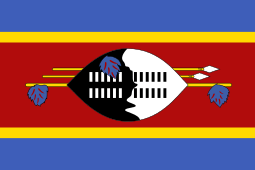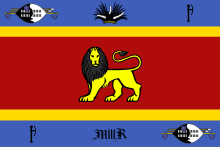Flag of Swaziland
 | |
| Name | Swaziland |
|---|---|
| Use | State and war flag |
| Proportion | 2:3 |
| Adopted | October 6, 1968 |
| Design | A horizontal triband of blue (top and bottom) and the yellow-edged red (triple width) with the large black and white Nguni shield covering two spears and the staff decorated with the feather tassels called injobo (tassels-bunches of feathers of the widowbird and the lourie) all centered horizontally of the red band. |
The flag of Swaziland was adopted on October 6, 1968[1] after Swaziland gained independence from Britain on September 6, 1968. The design of the flag is based on a flag given by King Sobhuza II to the Swazi Pioneer Corps in 1941.
History
The flag is based on the military flag given by King Sobhuza II to the Swazi Pioneer Corps in 1941 to remind them of the nation's military traditions.[2] On 25 April 1967, the day the pledge of oath was taken by the king the flag was hoisted for the first time.The College of Arms in London registered the flag on 30 October 1967. The first official hoisting of the flag was conducted on this day.[1]
Specifications
The flag is rectangular with length and breadth in a ratio of 3:2 respectively.[1] The red stands for past battles, the blue for peace and stability, and the yellow for the resources of Swaziland.[1] The central focus of the flag is a Nguni shield and two spears, symbolizing protection from the country's enemies. Its colour is meant to show that white and black people live in peaceful coexistence in Swaziland.[3] The flag has four horizontal stripes - two blue strips at the top and bottom while the center stripe is red. Two thin yellow strips border the red strip in the flag. On the red strip is an ox hide combat shield from the traditional Swazi Emasotsha Regiment, laid horizontally. The shield is reinforced by a staff from which hangs injobo tassels-bunches of feathers of the widowbird and the lourie. They also decorate the shield. These feathers are used only by the king.[1] Above the staff are two assegais-local spears,[1] a Swazi fighting stick and three royal Swazi ornamental tassels called tinjobo, which are made from widow bird and loury feathers.[2]
Other flags
-

1894-1902 flag
-

Royal standard of Swaziland
References
- 1 2 3 4 5 6 "Swaziland". Flagpost. Retrieved 15 September 2014.
- 1 2 "Swaziland flag". World Flags. Retrieved 15 September 2014.
- ↑ "Embassy of the Kingdom of Swaziland". Swaziland.org. Retrieved 15 September 2014.